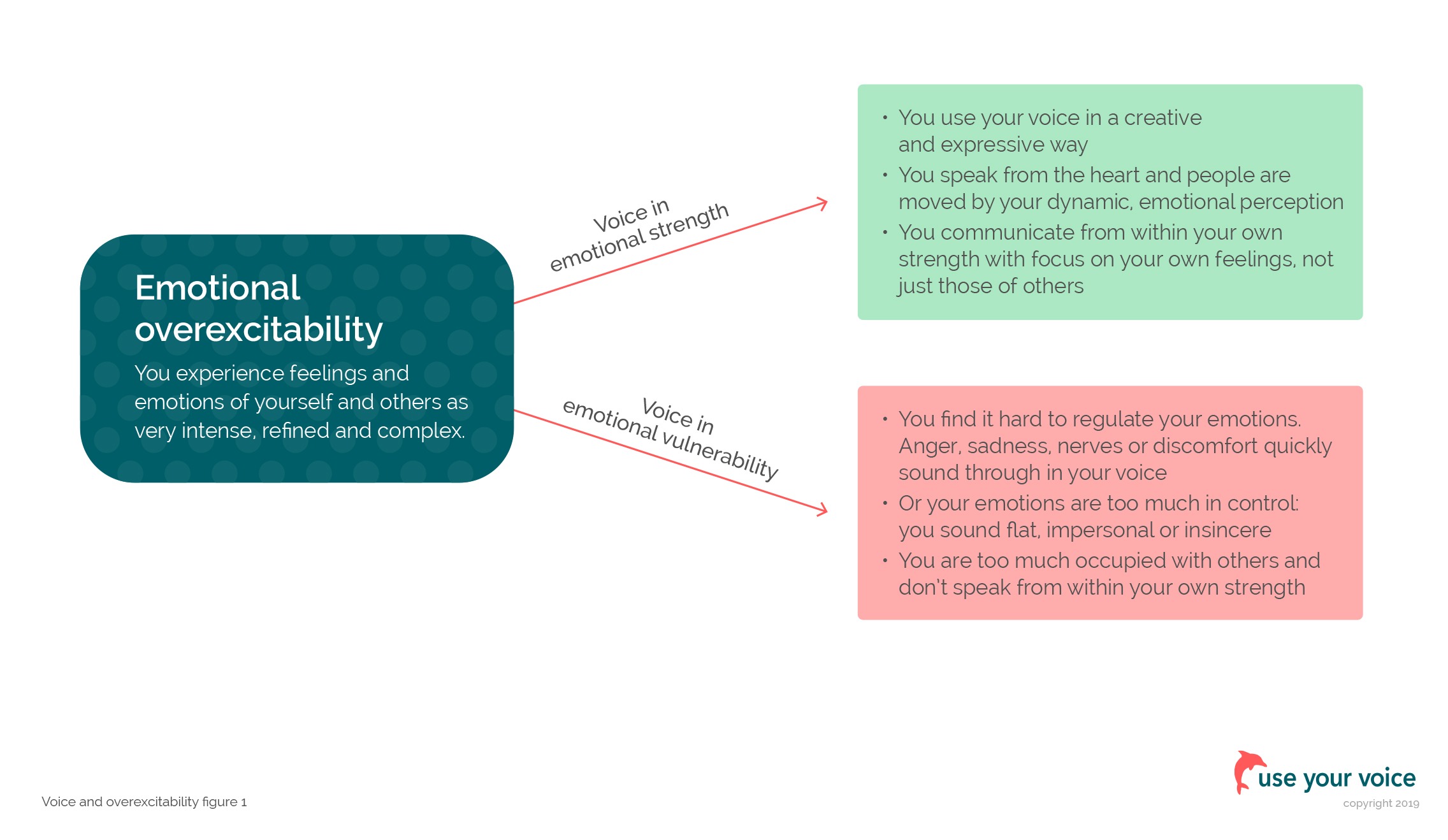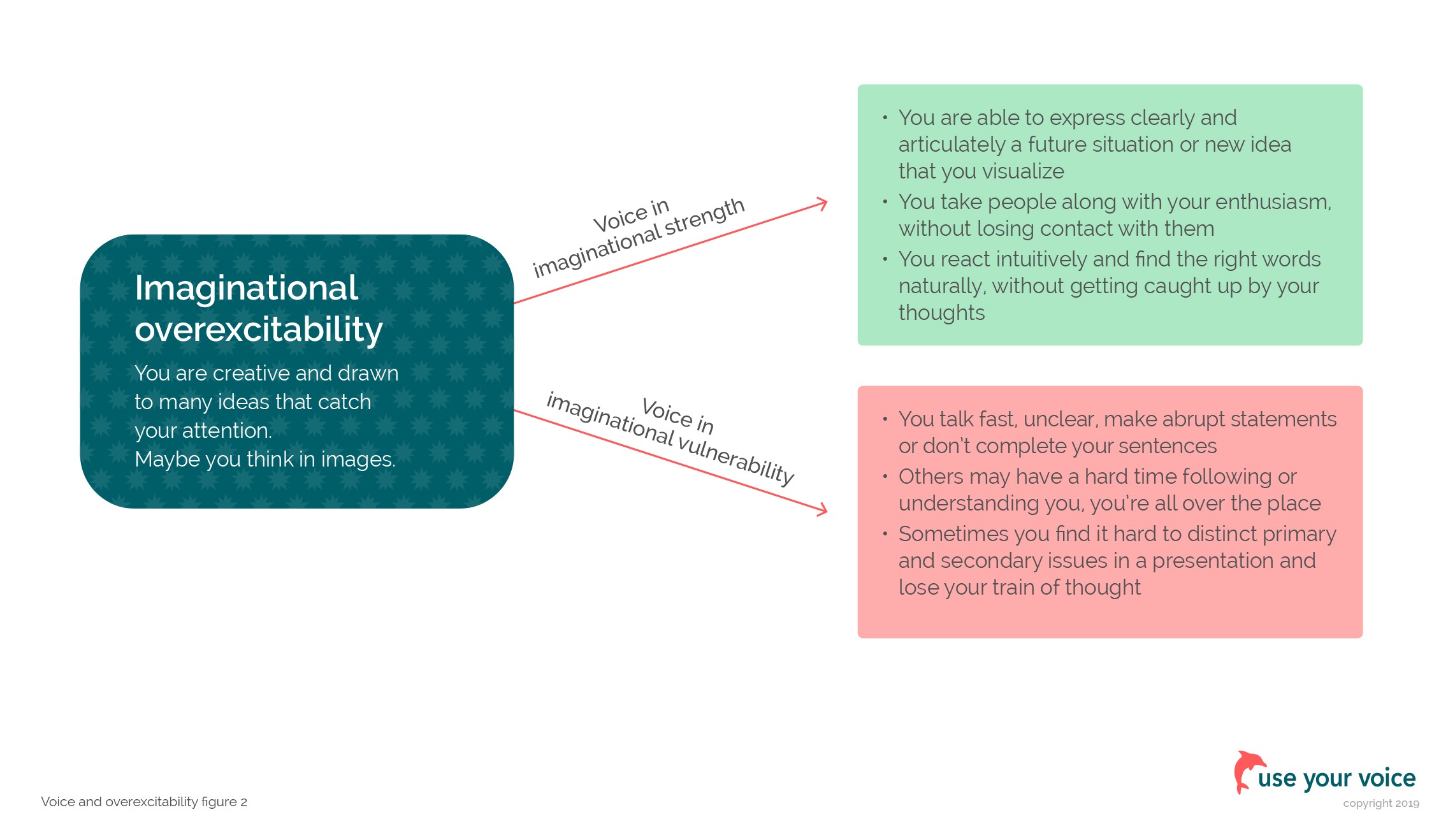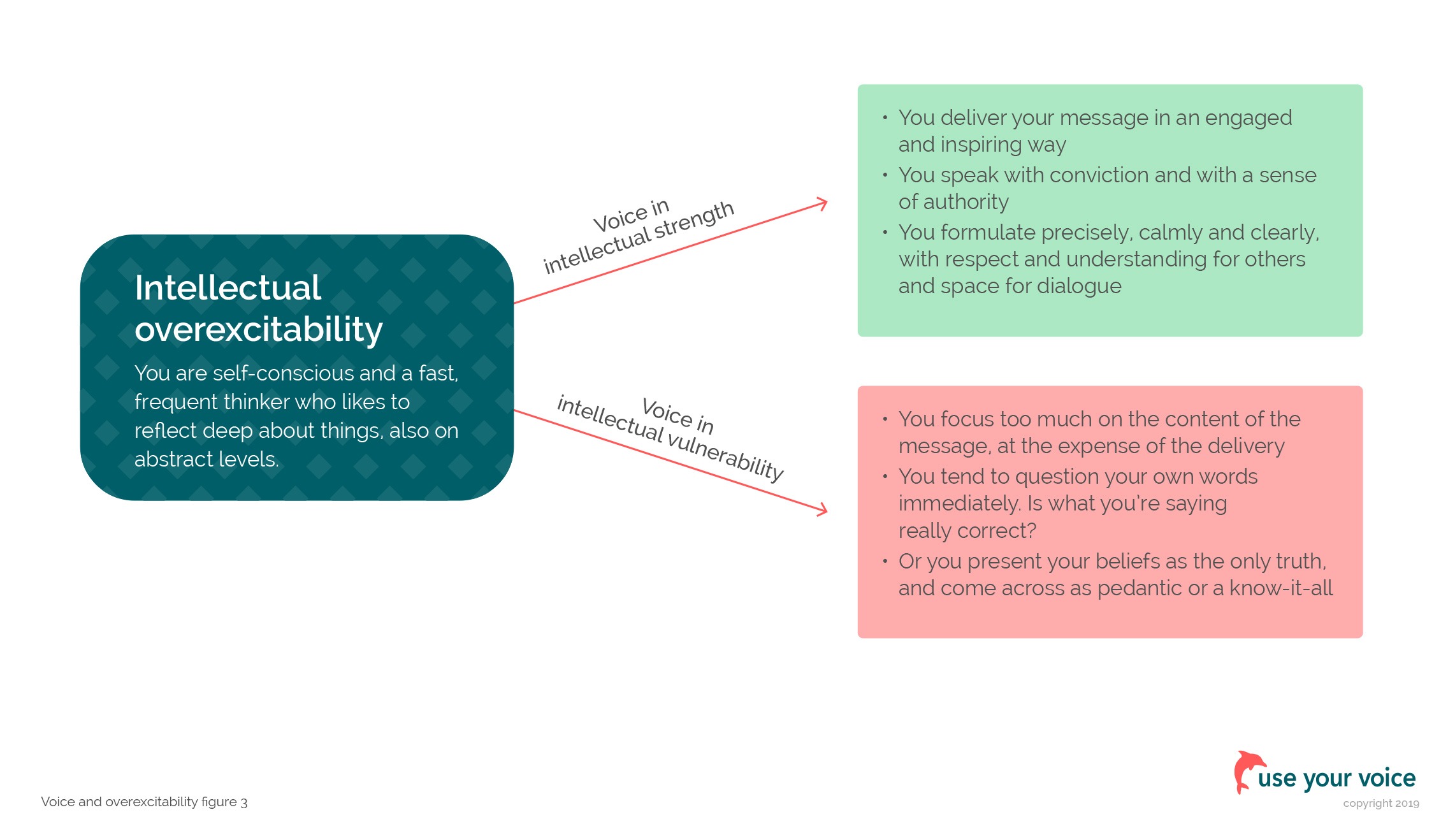I coach voices. That is, people come and see me when they experience a problem with voice or communication. They find it difficult to make themselves heard or feel that they are not always being understood. They might have a hard time expressing themselves or struggle with nervousness when they have to speak in front of a group. Often, however, a request for help about the voice is not just about the voice. Your voice is kind of a barometer, and can indicate that something is out of balance in another area of your life.
I have now worked with approximately a hundred people and their voices, and that has given me the following insight. Although all people are unique and need a completely personal approach, the voice problems they encounter are fairly universal and often traceable to certain personal qualities. Following my experiences, I have developed a model that I base on the overexcitabilities (OEs) from the theory of positive disintegration by Kazimierz Dabrowski.
As regular Third Factor readers know, overexcitability is a hypersensitivity to stimuli. Everything you experience is processed by your brain in your central nervous system—your thoughts, feelings, emotions, fantasies, ideas, and so on. But an overexcitable person reacts more strongly to stimuli than average. This hypersensitivity means that you process these stimuli more intensively and deeply. Dabrowski outlined five forms of OE, of which the first three in particular play a major role in self-development: emotional, intellectual, imaginational, psychomotor, and sensual OE.
Intense stimulus processing is an internal experience, but obviously also reveals itself when you start relating to the outside world. The moment you experience stress (whether positive or negative), OE can translate into all kinds of physical sensations: heart palpitations, flushing, headache, skin problems, sweating, digestive problems, cramped muscles, and so on.
As part of the physical system, the voice is one of the forms of human expression in which OE most clearly manifests itself. This might be in the form of something that is bothering you—that is, a vulnerability. But you can also transform that same characteristic into a strength or a talent. What could that look like?
Emotional Overexcitability
People who identify with emotional OE experience emotions as very intense, refined and complex. As a result, they often think about existential issues. They also strongly identify with other people’s emotions and feel a desire for deep connection with others.
How is this expressed through the voice? If you are emotionally empowered, you use your voice in a creative and expressive way to show your emotions. You speak from the heart and people are moved by your dynamic emotional perception. In this respect, you always consider the feelings of others — without ignoring yourself. You have a deep desire to show what you value through your voice.
If you are in a state of emotional vulnerability, however, this OE manifests differently. The balance generally either tips one way or the other. One possibility is that you have trouble regulating your emotions, and you therefore react to everything in overdrive. When you are angry, sad, nervous, or uncomfortable, you find it difficult to mask this, and it always sounds through in your voice.
The other possibility is that you regulate your emotions quite well and keep them under control—maybe a little too well. Because of this, you give the impression of being flat, cold, impersonal, or insincere. In fact, you are anything but flat and cold! You just don’t show the intensity of your inner world. Doing so makes you feel uncomfortable, because as a child you learned not to show that intensity.
In communication, it is also possible that you are too busy reading and considering the emotions of others. What are they thinking? Am I doing it right? Isn’t it too boring? Am I offending anyone? Consequently, you are less present in your body and not firmly grounded. Your voice therefore loses strength and engagement.

Imaginational Overexcitability
People who recognize imaginational OE in themselves are extremely capable of visualizing something that they haven’t actually seen. They often have a talent for art, drama, or poetry, or a preference for fantasy, fiction, and simulation. They are creative, drawn to many different ideas, and may think in images. What they seek to express often springs initially from their inner world, rather than from the world around them.
If you are imaginationally empowered, you can fully take others along with your imagination through your voice—without losing contact with them! You are a master at inspiring enthusiasm in people. You can clearly and articulately express a future situation or a new idea that you have visualized. You respond intuitively and find the right words naturally, without getting caught up in your thoughts.
If you are in a state of imaginational vulnerability, however, you are carried away too much by all those different thoughts, which take you in all kinds of directions. Under tension, this can lead to outbursts of unexpected, abrupt statements. You take big mental leaps and you skip from one subject to the other. To keep up with yourself, you start talking quickly and unclearly and don’t complete your sentences. Because of this, you lose contact with the other person who may have a hard time following or understanding you. You find it difficult to distinguish primary and secondary issues. Perhaps you yourself no longer know exactly what you actually wanted to say…and you lose your train of thought.

Intellectual Overexcitability
People with intellectual OE typically think deeply about many different things, especially on an abstract or conceptual level. Because they have a talent for thinking in subject-object (that is, looking at themselves as though from the outside), they are very self-aware. They want to know exactly how everything works and absorb all kinds of knowledge. They also like to go to the root of things. They have rapid streams of thought and tend to rationalize or intellectualize.
If you are intellectually empowered, your voice is a wonderful means to express your message in an engaged, inspired way. You know what you are talking about, so you speak with conviction and a sense of authority. You owe it to your self-consciousness that you formulate precisely, calmly and clearly, with respect and understanding for others and space for dialogue. You won’t easily jump to conclusions or raise your voice.
Intellectual OE is another area that can manifest two distinct ways in vulnerability. On one hand, because you are constantly analyzing everything, you may tend to doubt yourself and the things you say. Is what I am claiming correct? Is it the absolute truth? This will make you look indecisive and reluctant.
On the other hand, intellectual OE can make you believe that your conviction is the only truth, leaving no space for the opinions of others. People may find that you come across as pedantic or a know-it-all.
In both cases, you are most likely too concerned with the content of your message at the expense of the delivery. Because of this, you are unable to move people.

Emotion and the Voice
I have not (yet) made a “strength versus vulnerability model” of the other two OEs because I believe that the Dabrowskian development potential concerning the voice is mainly reflected in the particular three discussed above. I suspect, however, that sensual OE invites you to express your voice in an aesthetic way: for example, by singing. Psychomotor OE could be related to stammering. It could also be the cause of fast and restless talking, as well as other nervous or impulsive speech habits.
You can certainly say that my work with the voice often affects someone’s personal inner world and emotional development. A voice problem can be a symptom of an inner conflict: an invitation to face a part from yourself that you’re turning down, or to start living according to your own values. As a voice coach, I take my client’s request for help on the voice level as a starting point, but we put this in the broad context of your personal, emotional development.
Like Dabrowski, I believe that transformation and change of behavior is only possible if it goes hand in hand with—and is triggered by—emotional growth. This means that if you really want to change something about the way you speak, you should consider your emotions in this process.
Do you recognize yourself in some of the vocal strengths and vulnerabilities of the OEs? Then I have some advice for you. In my experience, it’s best to approach this from two distinct but complementary angles. The first one is more what you might expect: you start by recognizing your natural speech habits and deciding what you want to change; then you train and expand your vocal comfort zone with voice exercises that support this goal. The second, however, is one that people often overlook: you must start raising your awareness of the role of thoughts and emotions in your life. I recommend setting time aside for introspection and investigation of your thoughts and feelings.
In an upcoming issue of Third Factor, I’ll have more to say about how you can work with this.
This article originally appeared in Dutch at positievedesintegratie.nl.
Header image: a photo of the author by Dok Luutse Brouwer Fotografie. Image below: Shutterstock.

Next: Laura discusses how to empower your voice.




